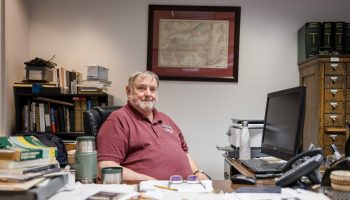
Kaitlyn Finchler
Contributing Writer
Tapping into some of the “hot button” issues facing the United States right now, religion is intersected with politics more than ever.
Besheer Mohamed, senior researcher at Pew Research Center, and Wajahat Ali, writer, former attorney and contributor to The New York Times, will explore the myriad questions surrounding religious people’s role in standing up — or not — for what they believe in.
The lecture, “A Christian, a Jew and a Muslim Walk into a Voting Booth: Religious Identity in Public Life,” will be at 2 p.m. today in the Hall of Philosophy for the Week Four Interfaith Lecture Series theme, “Who Believes What, and Why That Matters — in association with Pew Research Center.”
“We want to just talk about this current moment that we’re in where otherwise, allegedly, very religious people seem perfectly fine with cruelty,” Ali said. “On the flip side, … especially in the last six months, you’ve seen many religious communities now stand up against cruelty.”
Hoping to have a “very honest, blunt” conversation, Ali said these topics are on everyone’s minds, but they are “afraid to touch” them. However, religion’s role isn’t always tied to theology, Mohamed said.
“Sometimes it’s about identity, sometimes it’s about community,” Mohamed said. “I’ll talk about some of the situations in which people retain a religious sanity, despite not sharing some of the core theological precepts — or sometimes say they only have a sort of cultural, ethnic tie to a religious group. And, how despite that, they often still have distinctive views and attitudes on a variety of issues and talk a little bit about why that is.”
In American society, Mohamed said “the data is clear that” religion matters for a lot of people when they’re making decisions.
“They draw on their religious identities, their religious communities for guidance,” Mohamed said. “But that’s not true for all Americans, and there’s an increasingly large share of Americans for whom that’s not true.”
For the people to whom this doesn’t apply, Mohamed said they’re often not aware of the “profound impact that” religion can have.
“It’s sometimes difficult to make sense of why people are doing things, how people are coming to their decisions without understanding, because they don’t understand religion — they don’t have exposure to religion,” Mohamed said.
While a “very religious country” compared to European countries, Ali said, the United States doesn’t have “nuanced, intelligent conversations” about religion and how religion intersects with politics.
“When it comes to talking about religion publicly, people think religious communities are either vegans or carnivores,” Ali said. “I always tell people, people are like omnivores. It isn’t full-fledged fundamentalism or full-fledged atheism. Some people are like, ‘I’ll fast but I’ll also drink, but it’s a strong part of my identity.’ ”
Some of the lecture’s dynamic will include what “concrete facts we know” about religion and religious groups and how it affects a variety of issues, Mohamed said.
“Whether it’s views on sexuality, gender and sexuality, or views on foreign policy, the Israel-Hamas war in Gaza or Christian nationalism, I’ll be able to speak to what the data says, what share of the public has these views,” Mohamed said.
The “religious right” or people who identify as “MAGA” has “really courted religious communities,” Ali said. On the other hand, he said the Democratic Party has led to religion being “weaponized” against progress.
“But, there’s also a flip side where there are just communities who are perfectly fine for economic populism, helping immigrants and even when it comes to gay marriage or women’s rights,” Ali said. “… A couple years ago, a majority of Muslim Americans were fine with gay marriage in the sense that it wasn’t a major issue for them.”
In this context, Ali said it’s all about how the question is being asked. While some Muslim Americans may say gay marriage isn’t a major issue for them, if they had been asked, “Do you agree with gay marriage morally?” there would have been a different set of answers.
Ali said he wants the audience to realize religious communities can’t be ignored.
“You cannot paint them with a broad brush,” Ali said.
“You have to understand that by ceding the ground on these issues, some of the worst political actors have weaponized it to take this country back to the 19th century,” Ali said. “There is a better way forward with all of us working together against fascism.”
This will be Ali’s third time speaking at Chautauqua — most recently in 2022, in which he pitched multicultural work in the United States and the need for “ethnic avengers” regarding racism.
“What Americans have to realize — it’s all or nothing,” Ali said. “In the sense that you might not like the transgender (community) and you might not like undocumented immigrants, you might not like atheists and you might not like Muslims. But, the way it works in America is, in a multiracial democracy, it’s all of us or none of us because fascists come for everyone.”




